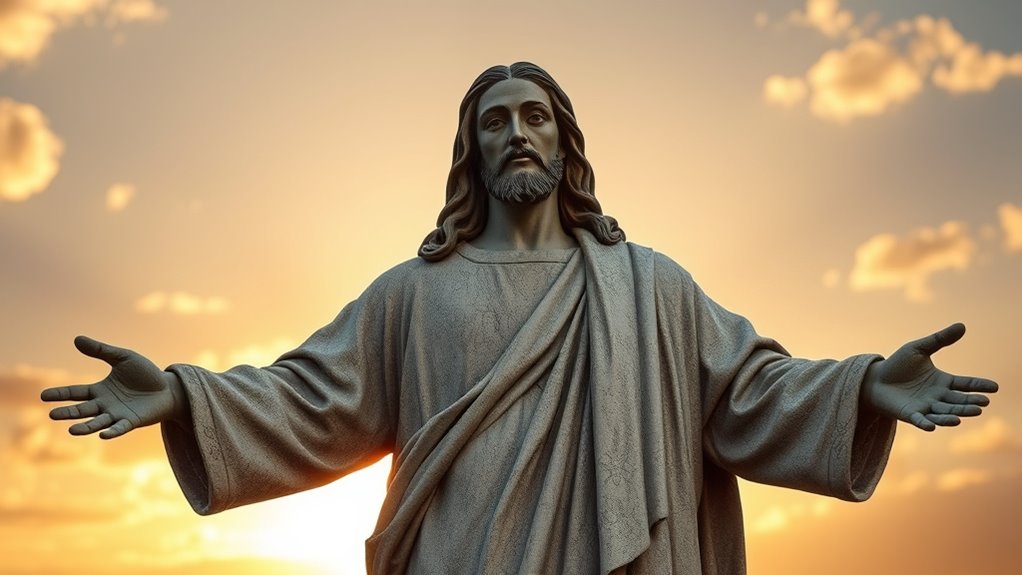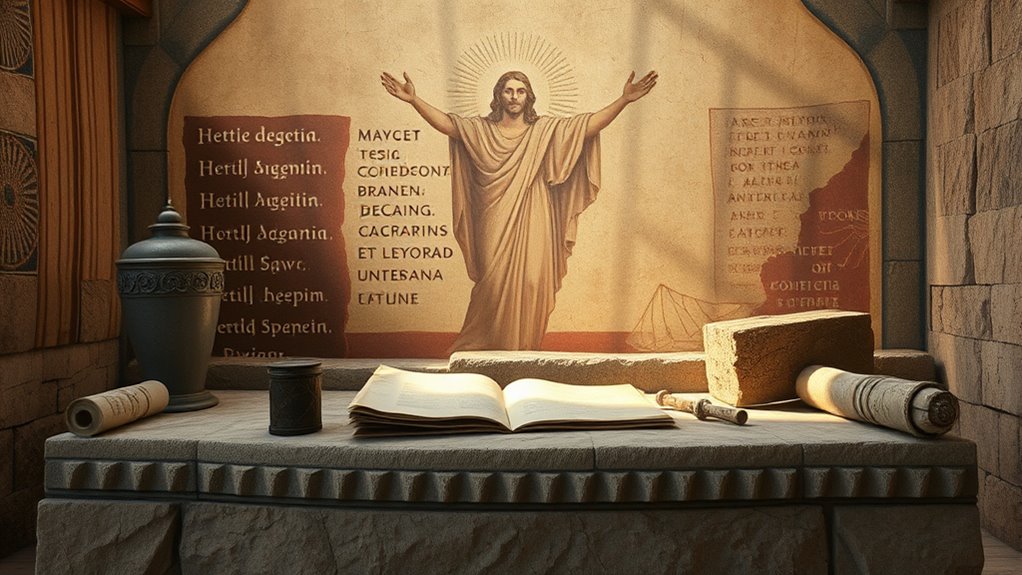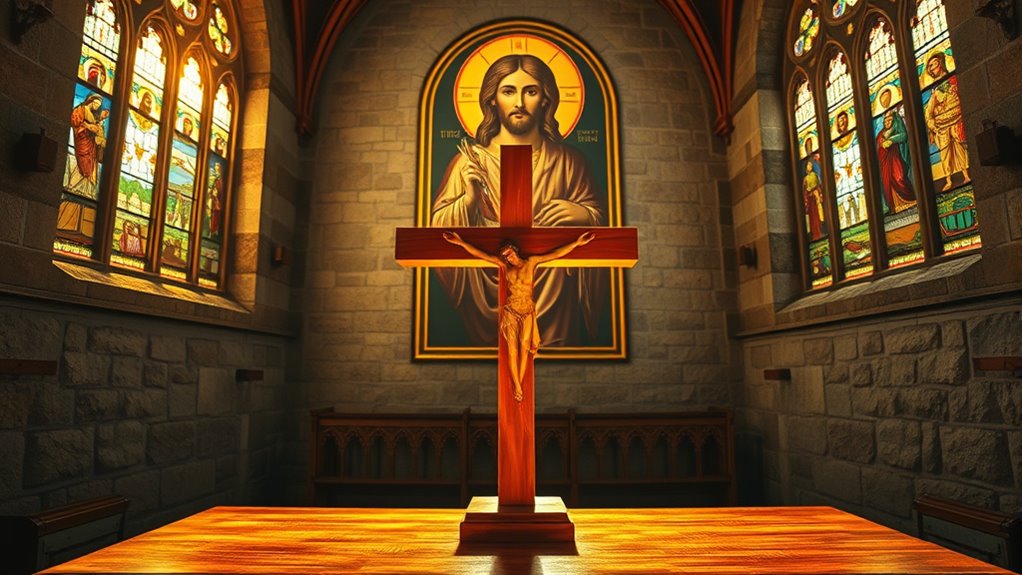Whether Jesus is God or just a prophet depends on your perspective. Christians believe He is divine, the Son of God, and accept His miracles and resurrection as proof of His deity. Others, like Muslims, see Him as a revered prophet, while many other religions view Him as a wise teacher or enlightened figure. Exploring the historical, biblical, and religious views can help you understand the diverse beliefs surrounding His true nature. You’ll discover more about this complex topic below.
Key Takeaways
- Christian belief affirms Jesus as divine, citing miracles, resurrection, and acceptance of worship as evidence of his Godhood.
- Many scholars and religious traditions see Jesus primarily as a prophet or moral teacher, not divine.
- The Bible records Jesus making divine claims, such as “I and the Father are one” (John 10:30), supporting his divine status.
- Other faiths, like Islam, regard Jesus as a revered prophet, not God, emphasizing his role without divinity.
- Debates about Jesus’s nature stem from differing interpretations of biblical texts and historical contexts.
Historical Perspectives on Jesus’ Identity

Have historians truly agreed on who Jesus was? Not entirely. The historical context of 1st-century Judea shapes many perspectives, but interpretations vary. Some see Jesus as a charismatic teacher or prophet, influenced by contemporary Jewish thought. Others consider the philosophical implications, questioning whether his actions point to divinity or merely moral leadership. The evidence from historical records, like writings outside Christian sources, offers clues but no definitive answer. This ambiguity fuels debates about Jesus’s true nature, revealing how different cultural and philosophical lenses influence understanding. By examining these perspectives, you see how history’s complex context affects beliefs about his identity—whether he was a divine figure or a prophet—highlighting the importance of interpretation in historical analysis.
Biblical Evidence Supporting Divinity

You’ll see that Jesus makes bold claims about his divine nature, which challenge ordinary understanding. His miracles, like healing the sick and controlling nature, showcase incredible power that points to his deity. Additionally, the worship and praise he receives from followers suggest recognition of his divine status.
Jesus’ Divine Claims
What biblical passages explicitly claim Jesus’s divine nature? Passages like John 10:30, where Jesus states, “I and the Father are one,” and John 8:58, where He declares, “Before Abraham was born, I am,” directly assert His divine identity. These claims reveal Jesus’ understanding of His divine authority.
Consider these powerful truths:
- Jesus’ miracles serve as evidence of His divine authority, confirming His claims to be more than just a prophet.
- His words consistently point to His unique relationship with God, emphasizing His divine nature.
- His own declarations leave no doubt—He claims to have divine origin and authority, asserting His identity as God incarnate.
Miracles Demonstrate Power
Do Jesus’ miracles serve as clear evidence of His divine power? Many believe that His acts of miracles and healing reveal divine authority beyond human capacity. These extraordinary events demonstrate His ability to command nature, heal illness, and even raise the dead, which many see as proof of His divine nature. Consider the following examples:
| Miracle | Significance |
|---|---|
| Feeding 5,000 with loaves | Demonstrates divine provision |
| Healing the blind | Shows authority over physical ailments |
| Walking on water | Exhibits mastery over natural laws |
| Raising Lazarus | Confirms power over life and death |
| Calming the storm | Reflects divine control over nature |
These miracles aren’t just acts of kindness—they point to divine authority that ordinary prophets couldn’t demonstrate.
Worship and Praise
Worship and praise directed toward Jesus in the Bible serve as powerful evidence of His divine nature. When people fall to their knees or offer heartfelt adoration, it reflects recognition of His divine authority. These acts of worship acknowledge His unique role, especially considering His sacrificial death, which fulfilled divine purpose. Such devotion is reserved for God alone, reinforcing His deity.
Consider these points:
- The wise men worshiped Jesus as God, not just a prophet, presenting Him with gifts.
- The crowds praised Jesus openly, recognizing His divine authority during His ministry.
- Jesus accepted worship, an act only God deserves, affirming His divine status.
This pattern of praise underscores the biblical view of Jesus as more than a prophet—He is divine.
The Teachings of Jesus as a Prophet

Jesus conveyed powerful prophetic messages and performed miracles that reinforced his role as a prophet. His moral and ethical teachings challenge you to live with compassion, justice, and integrity. These elements highlight how Jesus’s words and actions continue to inspire and guide millions today.
Prophetic Messages and Miracles
Many believe that Jesus’s prophetic messages and miracles reveal his role as a messenger chosen by God to guide and enlighten humanity. These acts, rooted in divine incarnation, fulfilled messianic prophecy and demonstrated his unique authority. His miracles, like healing the sick and feeding thousands, serve as powerful signs of his divine power and connection to God. They evoke deep emotion, inspiring faith and hope. Consider these moments:
- The healing of the blind, showing divine compassion and authority.
- Feeding the five thousand, illustrating divine provision and care.
- Walking on water, confirming his mastery over nature and divine origin.
These acts aren’t just miracles; they affirm Jesus’s role as a prophet sent to fulfill God’s divine plan, challenging you to see him as more than just a teacher.
Moral and Ethical Teachings
As a prophet, Jesus conveyed moral and ethical teachings that continue to resonate today, guiding you toward compassion, justice, and humility. His messages emphasize loving your neighbor, forgiving others, and caring for the vulnerable. His divine authority was evident not only through miraculous healings but also through his call for genuine kindness. These teachings challenge you to act ethically, embody humility, and seek justice. Visualize the following:
| Compassion | Justice |
|---|---|
| Miraculous healings | Forgiveness |
| Divine authority | Humility |
| Loving others | Serving the vulnerable |
These values reflect his role as a prophet who urged moral integrity, inspiring countless to live ethically based on divine guidance.
Early Christian Views and Creeds

In the earliest days of Christianity, believers sought to articulate their understanding of Jesus through concise statements known as creeds. These creeds played a crucial role in the early church, helping to unify believers and clarify core beliefs. During the creeds formation, key truths about Jesus emerged, which shaped Christian identity. Consider these powerful moments:
- The declaration of Jesus as divine, affirming His Godhood.
- The acknowledgment of His resurrection, proving His divine authority.
- The affirmation of Jesus’ eternal nature, emphasizing His divine status.
These early Christian views reflect a community wrestling with Jesus’ identity, ultimately shaping doctrines that would influence generations. The creeds serve as a testimony to how the early church sought to define whether Jesus was simply a prophet or something more profound.
Contrasting Views From Other Religions

Different religious traditions interpret Jesus’ identity in various ways, often contrasting sharply with early Christian beliefs. In Islam, Jesus (known as Isa) is considered a revered prophet, but not divine, emphasizing God’s oneness and rejecting the idea of Jesus as God. Hinduism, with its theological diversity, may see Jesus as a wise teacher or divine figure among many others, but not as the sole incarnation of God. Buddhism generally regards Jesus as an enlightened teacher or bodhisattva. These differing views foster rich interfaith dialogue, helping followers understand contrasting beliefs. Recognizing these perspectives highlights the importance of respecting diverse understandings of Jesus, especially within a globalized world. It encourages open conversations that promote mutual understanding amid theological differences.
The Role of Miracles and Resurrection

Miracles play a vital role in demonstrating Jesus’s divine nature, showing that his power goes beyond human ability. The resurrection, in particular, holds deep significance, affirming his victory over death and confirming his identity. Understanding these events helps you evaluate whether Jesus is truly God or simply a prophet.
Miracles Confirm Divinity
Have the miracles and resurrection of Jesus truly confirmed his divine nature? Many believe these acts showcase his divine authority, especially considering jesus’ genealogy links him to David and Abraham, anchoring him in historical dates around 4 BC to 30 AD. These miracles evoke powerful emotions because they challenge natural laws and affirm a higher power. Consider:
- The healing of the sick and blind, demonstrating compassion and supernatural power.
- The resurrection itself, proving victory over death and affirming his divine identity.
- The fulfillment of prophecy, connecting jesus’ life to biblical promises and historical dates.
These events leave a lasting impression, prompting you to question whether they point to a divine son of God or a remarkable prophet.
Resurrection’s Significance
Why is the resurrection of Jesus considered the most significant event in affirming his divine nature? In the historical context, Jesus’ resurrection signals a divine power that surpasses ordinary human limits, confirming his unique status. Cultural influences of the time, including Jewish beliefs about life after death and messianic expectations, shaped how this event was perceived. His resurrection challenged prevailing notions, emphasizing that he was more than a prophet—he was divine. This miracle became a cornerstone of Christian faith, demonstrating victory over death and affirming Jesus’ identity as the Son of God. The resurrection’s significance lies in its ability to transform Jesus from a moral teacher into a divine figure, shaping religious beliefs and inspiring millions throughout history.
Theological Arguments for Divinity

Theological arguments for Jesus’s divinity often hinge on claims that his nature and actions point beyond that of a mere prophet. These debates draw on cosmological debates about the universe’s origin and purpose, suggesting Jesus embodies divine authority. His fulfillment of eschatological expectations further supports his divine status, as he is seen as the ultimate fulfillment of prophecy. Consider these points:
- Miraculous acts that defy natural laws, hinting at divine power.
- Claims of eternal existence and unity with God, asserting a divine nature.
- Fulfillment of prophecy, confirming his role in divine eschatological plans.
Together, these arguments challenge the idea of Jesus as just a prophet, suggesting a divine identity rooted in complex theological debates.
Cultural Impact and Perceptions

How has Jesus’s identity influenced cultures around the world? His life and teachings have inspired countless artistic depictions, from Renaissance paintings to modern sculptures, shaping visual culture across centuries. These artistic depictions often emphasize his compassion, sacrifice, and divine nature, influencing how societies perceive him. Additionally, cultural celebrations like Christmas and Easter serve as powerful expressions of collective devotion and identity, reinforcing his significance. These festivities incorporate art, music, and rituals that reflect deep-rooted beliefs about Jesus’s role in salvation and morality. As you observe these cultural practices, you’ll notice how they influence social values and community cohesion. Jesus’s impact extends beyond religion, embedding itself into the arts and traditions that continue to shape societies worldwide.
Modern Interpretations and Debates

Have modern perspectives reshaped how people view Jesus’s identity? Today, debates continue to evolve, influenced by medieval debates and modern skepticism. These discussions challenge traditional views and spark emotional responses.
Consider:
- How centuries of theological debates have shaped differing beliefs.
- How modern skepticism questions the divine nature of Jesus, fueling doubt and curiosity.
- How new interpretations inspire both hope and controversy in faith communities.
These debates evoke strong feelings, prompting you to reconsider what you believe. As perspectives shift, some see Jesus as a symbol of moral teaching, while others affirm his divine status. The ongoing dialogue keeps the question alive, revealing how history’s debates still influence your understanding today.
How Different Faiths Understand Jesus

Different faiths interpret Jesus in ways that reflect their core beliefs and traditions. In interfaith dialogue, understanding these perspectives helps foster respect and clarity. Christians see Jesus as divine, emphasizing religious symbolism like the Trinity and His resurrection. Muslims respect Jesus as a prophet but reject His divinity, highlighting His role in conveying God’s message. Jews generally view Jesus as a historical figure, not as the Messiah, focusing less on religious symbolism and more on historical context. Each tradition’s interpretation influences how followers perceive His significance. Recognizing these differences promotes mutual understanding and reduces misunderstandings. By exploring how various faiths understand Jesus, you gain insight into their unique theological frameworks and foster respectful conversations across religious boundaries.
Frequently Asked Questions
How Do Different Denominations Interpret Jesus’ Divine Nature?
Different denominations interpret Jesus’ divine nature through the lens of the Trinity doctrine, emphasizing that Jesus shares divine authority with God the Father and the Holy Spirit. Some see Jesus as fully divine, central to salvation, while others view him as a prophet with special authority. You’ll find variations in belief about his divine nature, but most agree he holds a unique, divine authority that influences faith and worship practices worldwide.
What Evidence Do Non-Christian Religions Cite Against Jesus’ Divinity?
Many non-Christian religions scrutinize Jesus’ divinity by spotting biblical contradictions and questioning prophetic distinctions. They suggest inconsistencies in scripture, arguing that these contradictions cast doubts on divine claims. Prophetic distinctions highlight differences between Jesus and true prophets, emphasizing his human limitations. You see, skeptics state that such biblical contradictions and prophetic distinctions disprove Jesus’ divine status, insisting he was a revered prophet, not God, and challenge the divine narrative Christians portray.
Did Jesus Ever Explicitly Claim to Be God?
You wonder if Jesus ever explicitly claimed to be God. Biblical quotations like John 10:30, where he says, “I and the Father are one,” suggest he’s asserting divine status. These statements carry significant theological implications, implying that Jesus saw himself as more than a prophet. While some interpret his words differently, many Christians believe his declarations directly affirm his divinity, shaping core doctrines of Christianity.
How Have Historical Debates About Jesus Evolved Over Centuries?
Think of the debate about Jesus as a river flowing through time. Over centuries, early church controversies sparked fierce debates over His nature, shaping foundational beliefs. Medieval theological discussions added layers of complexity, refining doctrines like the Trinity. You see, these ongoing debates reflect evolving ideas, illustrating how perceptions of Jesus shifted from simple prophet to divine figure, influencing Christian faith and doctrine through history.
Can Jesus Be Both a Prophet and God Simultaneously?
You might wonder if Jesus can be both a prophet and God simultaneously, which touches on his divine identity. Many believe that the prophet versus God debate isn’t mutually exclusive; some see Jesus as fulfilling both roles. This perspective emphasizes his divine nature while recognizing his prophetic work. Ultimately, your view depends on how you interpret his divine identity and the relationship between prophet and God in your faith.
Conclusion
Imagine standing at a crossroads where two paths meet: one leading to a towering mountain of divine truth, the other to a humble valley of prophecy. Your choice shapes your understanding of Jesus—either as the divine summit reaching into the heavens or a revered prophet guiding you along a sacred journey. Whichever path you choose, remember that your perspective colors the story, and in the end, it’s your belief that crafts the legacy of Jesus’ true identity.










